
What Is a Blockchain Entrepreneur? 8 Ways They're Revolutionizing the Future of Business.
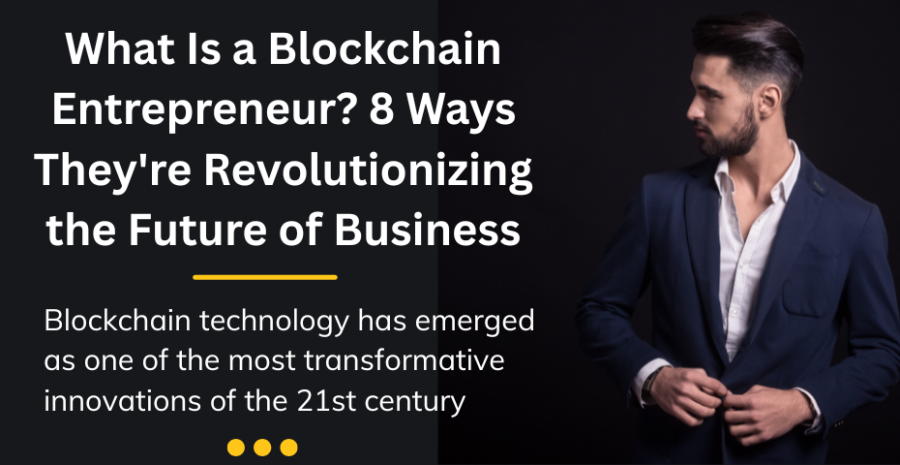
Blockchain technology has emerged as one of the most transformative innovations of the 21st century. At its core, blockchain is a decentralized, immutable ledger that records transactions across a network of computers. This means no single entity has control, and once a transaction is recorded, it cannot be changed or deleted.
But beyond powering cryptocurrencies like Bitcoin or Ethereum, blockchain's real power lies in its potential to reshape how businesses are built, operated, and scaled.
Enter the blockchain entrepreneur—a new breed of visionary who harnesses this technology to develop innovative business models, solve inefficiencies, and create trustless systems that can operate at scale. These entrepreneurs aren't just starting companies; they're pioneering ecosystems, challenging centralized authority, and redefining how value is created and exchanged in the digital world.
A blockchain entrepreneur isn’t limited to tech startups or crypto tokens. They come from various industries—finance, healthcare, logistics, marketing, media, and more—all united by a vision of decentralization and transparency.
Unlike traditional business owners, blockchain entrepreneurs build solutions that often remove middlemen, reduce operational costs, and empower users through smart contracts and token economies.
Their ventures are typically community-centric, with open governance and user participation at the heart of their models. They focus on peer-to-peer value exchange, secure data management, and innovative reward systems that traditional companies can't match.
This rise of blockchain entrepreneurship marks a seismic shift in how businesses are born and scaled. We’re witnessing the rise of decentralized apps (dApps), tokenized assets, decentralized finance (DeFi), and self-sovereign identities -all powered by blockchain.
And the entrepreneurs behind these innovations are not just adapting to the future—they're creating it. So, what exactly defines a blockchain entrepreneur? What skills and strategies set them apart? And how are they changing the world of business?
In this blog, we explore eight key dimensions that define a blockchain entrepreneur - from their mindset and tools to the ecosystems they build and the long-term impact they envision.
The final point highlights Markethive, a leading blockchain-based market network built specifically for entrepreneurs, proving that the future of entrepreneurship is already unfolding right now.

Blockchain entrepreneurs are not just businesspeople—they're architects of decentralization. Unlike traditional entrepreneurs who often seek control over their platforms and products, blockchain innovators aim to distribute power, ownership, and decision-making across their ecosystems.
This means creating products and services where the users have a stake, and where governance is conducted through mechanisms like DAOs (Decentralized Autonomous Organizations).
Their north star isn’t just profit—it’s freedom, autonomy, and transparency. They envision a world where intermediaries are replaced by smart contracts, where trust is programmed, and where collaboration doesn’t require a central authority.
These visionaries often challenge longstanding structures, pushing back against monopolies, censorship, and financial exclusion.
Their projects aren't just ideas—they're revolutions wrapped in code. And at the core of all this is a mission to empower users, whether by giving them control over their data, finances, or identities.
Blockchain entrepreneurs know that decentralization isn’t just a tech feature - it’s a social shift, and they’re leading it.
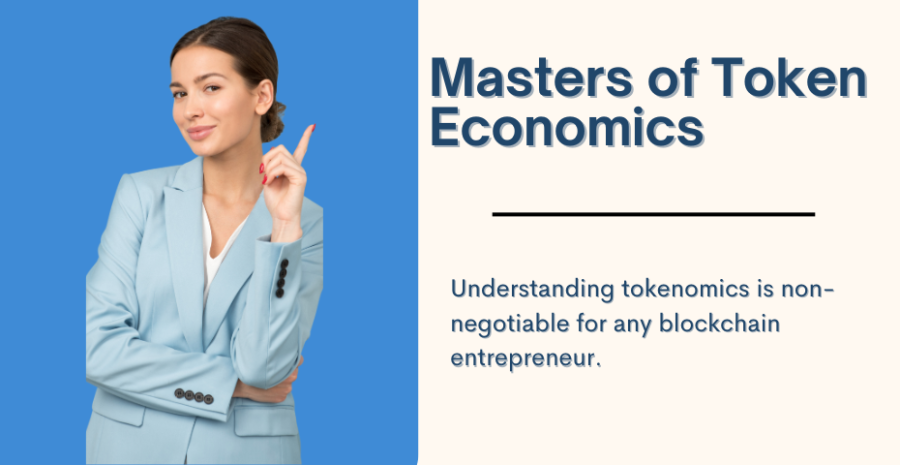
Understanding tokenomics is non-negotiable for any blockchain entrepreneur. Tokens - whether fungible like cryptocurrencies or non-fungible like NFTs - are the fuel of blockchain ecosystems.
These entrepreneurs design token models that incentivize user behavior, encourage loyalty, and reward community participation.
They think deeply about scarcity, inflation, governance rights, and utility, crafting economic systems that operate in closed loops with self-sustaining value creation.
For example, in a decentralized content platform, tokens might reward creators based on engagement, while also allowing users to vote on new features.
This type of token-driven economy empowers ecosystems to grow organically. Blockchain entrepreneurs must understand game theory, behavioral economics, and financial modeling to ensure that their tokens don’t just exist - they thrive.
And with increasing regulatory scrutiny, they also need to consider legal compliance and cross-border usability.
In essence, blockchain entrepreneurs aren't just building apps—they're building economies.
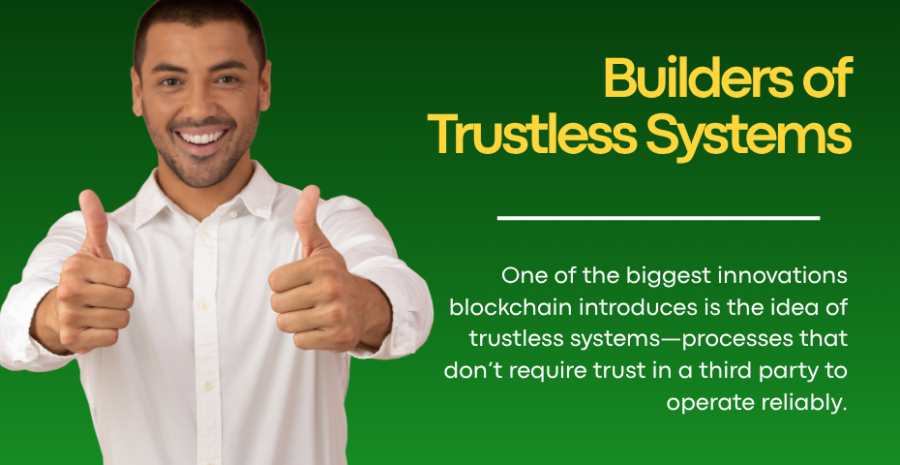
One of the biggest innovations blockchain introduces is the idea of trustless systems—processes that don’t require trust in a third party to operate reliably.
Blockchain entrepreneurs leverage this feature to build platforms where transactions and actions are verified by code, not people.
Through smart contracts, they automate agreements that execute only when predefined conditions are met. This eliminates human error, corruption, and the need for expensive intermediaries like lawyers or brokers.
A blockchain entrepreneur sees every process - whether it’s lending money, transferring assets, or verifying identity—as an opportunity to be simplified and secured via automation.
They create platforms where users can engage freely, knowing that the system enforces fairness by design.
This creates a new paradigm of trust—one built on mathematics and transparency, rather than institutional reputation.
It's a game-changer for industries plagued by inefficiency and fraud.

In the blockchain world, transparency is currency. Blockchain entrepreneurs typically operate within open-source ecosystems, where code is public, auditable, and often contributed to by global communities.
Rather than guarding their IP, they thrive on collaboration, peer review, and community innovation.
This mindset fosters rapid iteration, stronger security, and user-driven development.
Entrepreneurs working on blockchain projects often engage in developer communities, token governance forums, and GitHub repositories where their innovations are constantly challenged, improved, and forked.
This model of building in public has led to some of the most trusted platforms in crypto - because users can literally see how everything works.
For the blockchain entrepreneur, collaboration isn't a risk - it's a strength.
And as networks grow, contributors from all over the world can join in, earning tokens, building features, and co-owning success.
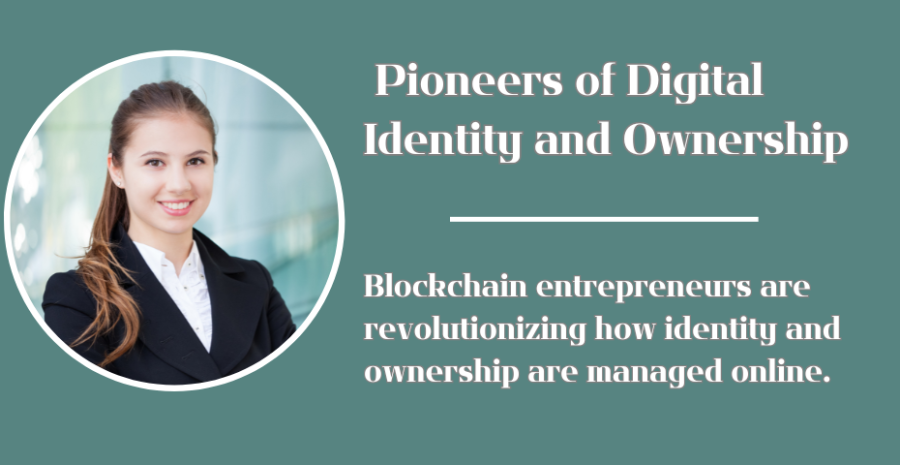
Blockchain entrepreneurs are revolutionizing how identity and ownership are managed online.
By using blockchain's immutable ledgers, they’re building systems where individuals can control their personal data, credentials, and digital assets without relying on centralized providers.
These entrepreneurs are key players in the development of self-sovereign identity (SSI) frameworks, where users own and manage their identity data - health records, certifications, even social media reputations.
They're also leading the charge in tokenizing real-world assets like real estate, music rights, and art, turning them into digital tokens that can be stored, traded, or used as collateral.
For a blockchain entrepreneur, ownership is not just legal—it's programmable.
They are building a world where proving ownership, transferring assets, and securing data is as simple as a few clicks, yet fully secure and globally verifiable.
This opens up huge opportunities for financial inclusion, intellectual property protection, and global commerce.
.png)
Decentralized Finance, or DeFi, is one of the most explosive sectors of blockchain—and it’s the playground for many blockchain entrepreneurs.
These pioneers are building lending platforms, decentralized exchanges (DEXs), yield farming protocols, and stablecoins that operate without banks or brokers.
They are creating alternatives to every part of the traditional financial system - without borders, without gatekeepers, and often with higher transparency and lower fees.
A blockchain entrepreneur in the DeFi space must balance innovation with risk management, building systems that are both profitable and secure.
They work with liquidity pools, automated market makers, oracles, and governance tokens to create ecosystems that function autonomously.
The beauty of DeFi is that it's open to anyone with an internet connection - and that democratization is exactly what drives these entrepreneurs.
They believe finance should be accessible, inclusive, and programmable - and they’re building that reality right now.
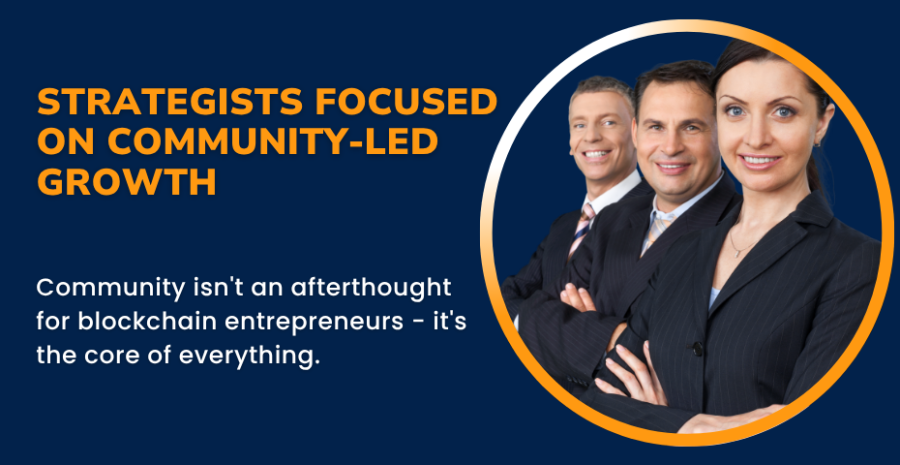
Community isn't an afterthought for blockchain entrepreneurs - it's the core of everything. Whether launching a new token or building a dApp, these entrepreneurs rely on strong communities to test, support, fund, and evangelize their projects.
Through mechanisms like airdrops, staking rewards, governance voting, and token-based incentives, they align their growth strategy with the interests of their users.
Community members become brand ambassadors, testers, developers, and even co-founders in spirit. The blockchain entrepreneur understands that a decentralized product must also have decentralized support - and that loyalty is earned through transparency and value-sharing.
They spend time on platforms like Discord, Telegram, and Twitter - not just for marketing, but for dialogue, feedback, and community co-creation.
Their goal isn't to build a user base, but a movement.

One of the best real-world examples of blockchain entrepreneurship in action is Markethive a decentralized market network built on blockchain, designed specifically for entrepreneurs.
Markethive isn’t just a social media platform or an inbound marketing suite - it’s both, and more. It offers a full suite of tools for bloggers, affiliate marketers, crypto enthusiasts, and small business owners to build, grow, and monetize their audiences without relying on centralized platforms that control visibility, engagement, or data.
What sets Markethive apart is its use of blockchain to decentralize control and reward users through its native cryptocurrency, Hivecoin. Users can earn Hivecoin by engaging with content, contributing to the platform, or growing their networks.
Hivecoin (HVC), Markethive's primary cryptocurrency, is a premium transactional token traded on significant cryptocurrency exchanges.
HVC serves as a utility token with a wide range of uses, including payment processing, exchange transactions, smart contract execution, and commerce token integration, in addition to its primary function within the Markethive ecosystem.
Users are rewarded with Markethive's coin for joining, participating, and using the platform's products and services.
This built-in reward mechanism transforms users into stakeholders. Additionally, Markethive's infrastructure ensures data privacy, content immutability, and censorship resistance - making it a true haven for freedom-minded entrepreneurs.
By combining the benefits of a social network, marketing platform, and crypto economy, Markethive represents the future of entrepreneurship—a future where platforms are built with users, for users, and owned by users.
Blockchain entrepreneurs are the vanguard of a new digital era—one where decentralization, transparency, and user empowerment are not just ideals, but operational principles.
They are redefining what it means to build a business in the 21st century, creating ecosystems that operate without central control, replacing gatekeepers with algorithms, and aligning value with community participation.
These entrepreneurs are not only responding to technological change - they are driving it. They’re building a world where identity is self-owned, data is secure, and opportunities are borderless.
Their innovations span across finance, marketing, healthcare, education, logistics, and governance, showing that blockchain is not just a tool for crypto traders - but a foundation for global transformation.
As we’ve seen in this blog, blockchain entrepreneurship is about more than writing smart contracts or launching tokens. It’s about rethinking trust, value, and collaboration from the ground up. These entrepreneurs are skilled in economics, governance, cybersecurity, and growth strategy.
They thrive on open-source collaboration, lean into community leadership, and embrace regulatory uncertainty with boldness. They're not just building companies—they're building infrastructure for the next digital age.
Platforms like Markethive embody everything that makes blockchain entrepreneurship powerful: decentralization, real ownership, fair reward systems, and tools that actually help entrepreneurs succeed in a noisy, competitive world.
As blockchain continues to evolve, those who understand how to build on top of it will be the ones shaping the future—not just of business, but of society.
So, what is a blockchain entrepreneur? They’re a builder, a disruptor, a strategist, a community leader - and most of all, a visionary.
And if you're inspired by the promise of freedom, innovation, and decentralized success, maybe it’s time to become one.
Your time to thrive is now. One step at a time.
....................................................................................................................................................................................................
About: Andries vanTonder
Over 46 years selfemployed
He is a Serial Entrepreneur, an Enthusiastic supporter of Blockchain Technology and a Cryptocurrency Investor
Find me: Markethive Profile Page | My Twitter Account | My Instagram Acount | and my Facebook Profile.
